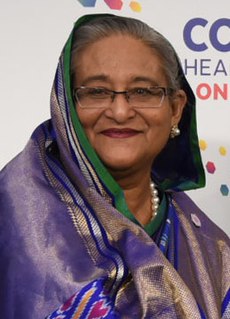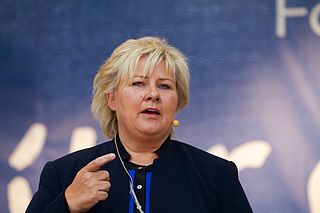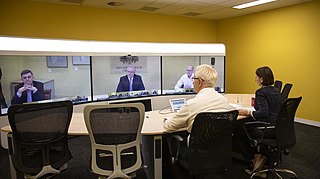
The prime minister of India, officially the prime minister of the Republic of India is the head of the executive branch of the government of India. The prime minister is the presiding member of the Council of Ministers of the central government and heads the federal cabinet. They can be a member of any of the two houses of the Parliament of India—the Lok Sabha and the Rajya Sabha ; but has to be a member of the political party or coalition, having a majority in the Lok Sabha.

The prime minister of Japan is the leader of the executive branch of the government of Japan and the chief authority of the National Cabinet. The prime minister is also the chief adviser to the emperor and the commander-in-chief of the Japan Self-Defense Forces; he is appointed by the Emperor of Japan after being designated by the National Diet and must enjoy the confidence of the House of Representatives to remain in office. He is the head of the Cabinet and appoints and dismisses the other ministers of state. The literal translation of the Japanese name for the office is Minister for the Comprehensive Administration of the Cabinet.

The Cabinet of the United States is a body consisting of the vice president of the United States and the heads of the executive branch's departments in the federal government of the United States, which is regarded as the principal advisory body to the president of the United States. The president is not formally a member of the Cabinet. The heads of departments, appointed by the president and confirmed by the Senate, are members of the Cabinet, and acting department heads also sit at the Cabinet meetings whether or not they have been officially nominated for Senate confirmation. The president may designate heads of other agencies and non-Senate-confirmed members of the Executive Office of the President as members of the Cabinet.

The Cabinet of the United Kingdom is the senior decision making body of the Government of the United Kingdom. A committee of the Privy Council, it is chaired by the Prime Minister and its members include Secretaries of State and other senior ministers.

The Prime Minister of Belgium or the Premier of Belgium is the head of the federal government of Belgium, and the most powerful person in Belgian politics.
A minister without portfolio is either a government minister with no specific responsibilities or a minister who does not head a particular ministry. The sinecure is particularly common in countries ruled by coalition governments and a cabinet with decision-making authority wherein a minister without portfolio, while they may not head any particular office or ministry, may still receive a ministerial salary and has the right to cast a vote in cabinet decisions. In some countries where the executive branch is not composed of a coalition of parties and, more often, in countries with purely presidential systems of government, such as the United States, the position of minister without portfolio is uncommon.
Public holidays in Thailand are regulated by the government, and most are observed by both the public and private sectors. There are usually nineteen public holidays in a year, but more may be declared by the cabinet. Other observances, both official and non-official, local and international, are observed to varying degrees throughout the country.

The prime minister of Malaysia is the head of government of Malaysia. The prime minister directs the executive branch of the federal government. The Yang di-Pertuan Agong appoints as the prime minister a member of Parliament (MP) who, in his opinion, is most likely to command the confidence of a majority of MPs; this person is usually the leader of the party winning the most seats in a general election.

The Government of India, also known as the Central or Union Government or simply the Centre, is the Union government created by the Constitution of India as the legislative, executive and judicial authority to govern the union of twenty eight states and eight union territories. The seat of the government is located in New Delhi, Delhi.

The Prime Minister of Egypt is the head of the Egyptian government. A direct translation of the Arabic-language title is "Minister-President of Egypt" and "President of the Government". The Arabic title can also be translated as "President of the Council of Ministers", as is the case with the Syria, despite the Arabic title being the same in Syria and Egypt.
The Cabinet of Ministers of Ukraine, commonly referred to as the Government of Ukraine, is the highest body of state executive power in Ukraine. As Cabinet of Ministers of the Ukrainian SSR, it was formed on 18 April 1991, by the Law of Ukrainian SSR No.980-XII. Vitold Fokin was approved the first Prime Minister of Ukraine.

The Cabinet of Syria is the chief executive body of the Syrian Arab Republic.

The chancellor of Germany, officially the Federal Chancellor of the Federal Republic of Germany, is the head of the federal government of Germany and the commander in chief of the German Armed Forces during wartime. The chancellor is the chief executive of the Federal Cabinet and heads the executive branch. The chancellor is elected by the Bundestag on the proposal of the federal president and without debate.

The Cabinet Secretary is the top-most executive official and senior-most civil servant of the Government of India. The Cabinet Secretary is the ex-officio head of the Civil Services Board, the Cabinet Secretariat, the Indian Administrative Service (IAS), and all civil services under the rules of business of the government.

The Cabinet of Bangladesh is the chief executive body of the People's Republic of Bangladesh. The Cabinet is the collective decision-making body of the entire government under the Office of the Prime Minister, composed of the Prime Minister and some 25 Cabinet Ministers, 7 Advisers, 18 State Ministers and 3 Deputy Ministers.

The Prime Minister of the Democratic Socialist Republic of Sri Lanka is the deputy head of the government of Sri Lanka, and the most senior member of parliament in the cabinet of ministers. The Cabinet is collectively held accountable to parliament for their policies and actions.

A cabinet is a body of high-ranking state officials, typically consisting of the executive branch's top leaders. Members of a cabinet are usually called cabinet ministers or secretaries. The function of a cabinet varies: in some countries, it is a collegiate decision-making body with collective responsibility, while in others it may function either as a purely advisory body or an assisting institution to a decision-making head of state or head of government. Cabinets are typically the body responsible for the day-to-day management of the government and response to sudden events, whereas the legislative and judicial branches work in a measured pace, in sessions according to lengthy procedures.

The Solberg Cabinet was the government of the Kingdom of Norway, headed by Conservative Party leader Erna Solberg as Prime Minister from 16 October 2013 to 14 October 2021. The government was appointed by King Harald V on 16 October 2013 following the parliamentary election on 9 September, consisting of the Conservative Party and the Progress Party as a minority government. On 16 December 2015, the cabinet was re-shuffled. The government secured renewed support following the 2017 parliamentary election. It was expanded on 14 January 2018, when an agreement was reached to include the Liberal Party, and further expanded on 22 January 2019 when the Christian Democratic Party joined the coalition. On 20 January 2020, the Progress Party announced that it would withdraw from the government, citing the decision to bring home the family of a sick child from Syria, which included the child's mother, a Norwegian citizen who had volunteered for the Islamic State.

The third Rutte cabinet has been the cabinet of the Netherlands since 26 October 2017. It was formed by a coalition government of the political parties People's Party for Freedom and Democracy (VVD), Christian Democratic Appeal (CDA), Democrats 66 (D66) and Christian Union (CU) after the general election of 2017. The cabinet formation took 225 days, a record high in the Netherlands.

National Cabinet is the Australian intergovernmental decision-making forum composed of the prime minister and state and territory premiers and chief ministers. Originally established on 13 March 2020 in response to the COVID-19 pandemic, National Cabinet replaced the now-defunct Council of Australian Governments (COAG) as the primary intergovernmental forum on 29 May 2020, citing excessive bureaucracy and infrequent meetings. National Cabinet is composed of the main forum, and specialised committees focusing on: rural and regional Australia, skills, infrastructure, health, transport, population and migration, and energy.
















